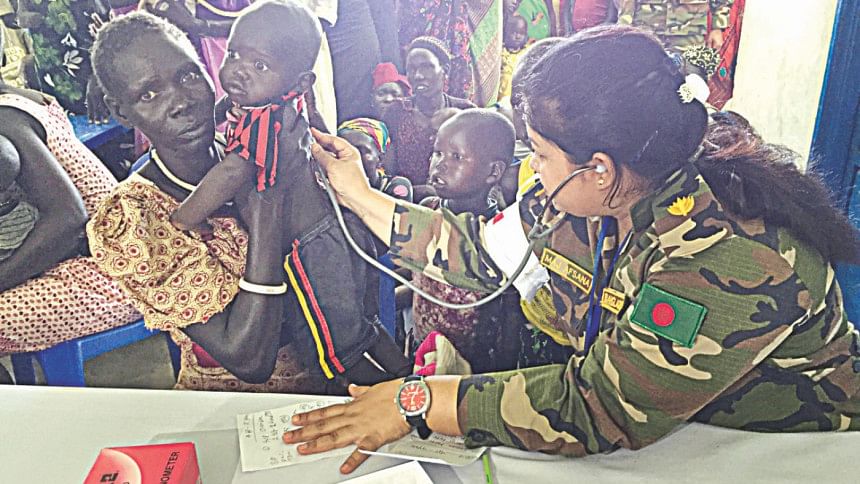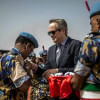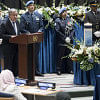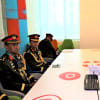Helping S Sudan move forward

Seven years into its independence, the youngest country in the world still remains one of the most violent.
South Sudan's civil war, provoked by ethnic divide, has so far killed as many as 300,000 people and displaced almost a quarter of its 12 million people.
In the South Sudanese capital, Juba, Bangladeshi peacekeepers have been stationed since as early as 2005. They were the first UN Bangladeshi contingent to arrive, and at that time the runway was barely a strip of concrete surrounded by motley tents.
"When we first arrived here on a UN flight, the father of the nation of South Sudan Dr John Garang de Mabior welcomed us at the airport," said Major Muhammad Shoeb Shafiq, who was in the first Bangladeshi peacekeeping mission in South Sudan in 2005.
Bangladeshi peacekeepers have been working in the country since then. When they were asked to construct roads, they soon found roadside mines. “But there were no signs or marks," the ex-peacekeeper remembered.
Even today, only a few kilometres of the roads in the capital city is functional.
“Bangladesh sent the first contingent in 2005. Since then we started working together and we are still working together,” Juma Jada, state minister for health in South Sudan, told The Daily Star. “It has been a great journey and Bangladesh has become one of the most trusted friends of South Sudan."
But earning the trust of the South Sudanese was not easy. Bangladeshi peacekeepers had to participate in various social activities to engage the locals enough to win over hearts.
As part of this process, they set up medical clinics, hygiene camps, and distributed educational material and sporting equipment.
The Nyori County of Terekeka State in South Sudan had a similar programme, where people queued for hygiene kits being distributed by Bangladeshi peacekeepers.
"They have been helping the local community look forward,” Sastin Swaka Bambu, head teacher of Keji Juba Primary School, said about the Bangladeshi peacekeepers.
The teacher was grateful that the peacekeepers had constructed a five-kilometre long road connected with the highway for free.
Head of the community at Nyori, Federic Jube Tongon, said, “Bangladeshi peacekeepers have done an excellent job. We want their support and we would like them to continue their mission in our area.”
Joseph Pitia Morbe, commissioner of Nyori County, said the locals love the Bangladeshi peacekeepers. He said he hoped that they would build more roads and ensure safe drinking water.
Lieutenant Colonel Mohammad Tariqul Alam, Contingent Commander of Bangladesh Engineer-1 said, “The locals had been requesting us for a long time to construct a road. We finally built one, as a gesture to win over their hearts.”
He also said they regularly operated medical clinics in the remote areas, where healthcare was a luxury.
At a local school where a temporary clinic was set up, hundreds of people lined up for their medical check-up and free medicine.
Major Sultana Dil Afsana, medical officer of Bangladesh army, said most of the women and children were suffering from malnutrition and skin diseases.
"Food scarcity and lack of hygiene are the major causes for their sufferings. The South Sudanese eagerly wait for us to provide free medicine," she said.
Recently, and with the football World Cup coming up, Bangladeshi peacekeepers are taking into consideration the infectious passion for football that South Sudanese have, and distributing jerseys to the young boys.
"South Sudanese love football. We have prepared four football grounds for them and we regularly provide them with jerseys and equipment," Tariqul added.
Two groups of Bangladeshi journalists are visiting some African countries to commemorate Bangladesh's 30 years in UN peacekeeping missions.

 For all latest news, follow The Daily Star's Google News channel.
For all latest news, follow The Daily Star's Google News channel. 








Comments